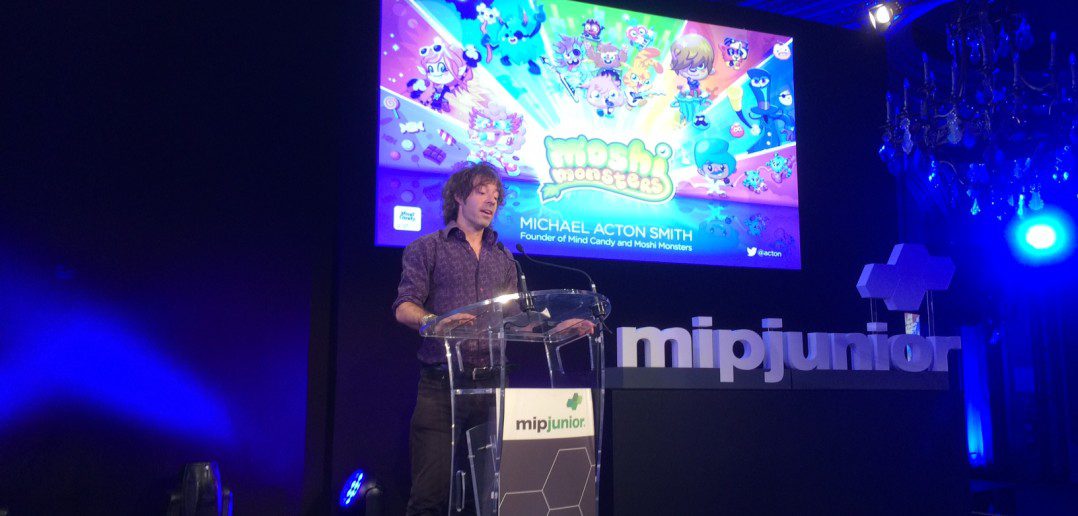70m children have registered for Moshi Monsters, the virtual world launched in 2008 by British startup Mind Candy. Its founder and CEO Michael Acton Smith appeared at MIPJunior today to talk about its growth, its evolving digital strategy, and its move into linear content with a TV series and feature film.
He started with the early days, though. Moshi Monsters went live in April 2008, and “nothing happened”. For the first 18 months after launch, in fact, it wasn’t popular at all. “It was quite a scary period, we ran out of money halfway through and had to raise a bit more. A lot of sleepless nights,” he said. “After a lot of tinkering we finally found the magic in the summer of 2009.”
What was that magic? Acton Smith said the artwork and characters resonated with children, as did the quirkiness. But one tipping point was the realisation that “kids like to be social just as much as grown-ups: they love to show off and share, you see it in every playground“. Finding a way to make that safe online was the turning point for Moshi Monsters, with hockey-stick growth, signing up a new user every second.
Then the brand went offline with its characters and stories, through a deal with Penguin to make books, then toys, magazines, a music album that charted higher than Madonna and more. “We definitely didn’t just want to slap our label on products, but take every category we went into and find the Moshi-ness of it, and make it special,” he said. Now around $250m of Moshi products have been sold at retail.
“The two big challenges we face now. One is how we navigate this shift from the web, which is our DNA in terms of making a Flash website, and now like a lot of people we’re trying to get our head around the mobile and tablet universe. And second how we can develop stories from our online world and community” – from shortform animations to an 80-minute feature film.
Acton Smith stressed that there’s no silver bullet to creating great and successful children’s content: it’s luck and magic in equal measures. But he noted that the joy of digital was the ability to keep “tweaking and shaping” the service in response to the feedback and habits of its young audience.
Acton Smith was asked about Mind Candy’s move into the linear content world, with a TV series and feature film: the trailer for which he showed for the first time during the session. “We financed the movie ourselves,” he said, although Universal is now on board as the distribution partner for the film, which is coming out in December less than a year after the project was started. “I’d definitely rather do it that way: keep it in-house, rather than give it away and have it turn into something else.”
Mind Candy has been experimenting with shortform animation for a few years: short music videos on YouTube. Now the film is the primary focus, although the Moshi Monsters cartoon will be 52 11-minute episodes, and Mind Candy is holding a number of meetings at MIPCOM to discuss possible distribution for it.
“I’m just super-excited to be in the entertainment world at this moment,” he said. “It’s scary because things move so fast, but it’s exciting as well… If you’re innovative and a little playful, you can try new things.”
Mobile and tablet will be the cue for Mind Candy to ramp up its international expansion, but there are challenges in taking a property created for the web to tablets. “I’ll be honest, it’s been really tough. We thought we’d waltz in and have a successful app, and as most people have found, that universe is really tough. It’s great because anyone can create an app, but that’s why it’s tough. There’s so much content.”
Acton Smith noted there’s a lot of things to get right in mobile, including the challenge of how to make money, whether from paid downloads or in-app purchases. But he said the apps world is going to see some changes that may play to Moshi Monsters’ strengths.
“We’re going to move to a new phase of the kids and the app stores, rather than these very light, quick experiences where kids bounce in and out, we’ll see much bigger projects built for kids, more social, where they connect with an app for longer,” he said.
“We’re moving fast to a world where pretty much every kid will have a tablet. Not like now where most are using their parents’ tablets. That’s a fascinating opportunity: hundreds of millions of kids around the world with their own tablets, including the cheaper Android tablets that are coming out… We’re definitely shifting our DNA away from the web to mobile.”
Mind Candy also has three completely new IPs under development, separate to Moshi Monsters. “They will always start, these new brands, in the mobile and tablet space. And if they’re successful then we will start expanding them into different media. We’ll look at creating cartoons, toys and books. If they’re not successful, we’ll never talk of them again!”
Acton Smith was asked about rivals like Disney’s Club Penguin, and he said that has experienced similar challenges to Moshi Monsters in moving from web to mobile. But Acton Smith played down that rivalry.
“Where I see more our competitors emerging from are definitely in the App Store, everything from Talking Tom to Temple Run to Angry Birds, these extraordinary apps getting tens of millions of downloads,” he said. “That’s where kids are spending a lot of their time these days.”
Acton Smith also talked about the challenges in making money from mobile. “It’s really frustrating to look at companies like King with Candy Crush Saga, which I think has made about $180m in the last six months. And that’s hard to do in the kids space if you can’t do in-app purchases,” he said.
“I personally think theres an opportunity to do in-app purchases ethically… I don’t think it’s a binary thing, it’s not that in-app purchases shouldn’t be used for kids’ products.”
He also warned that while not much money is being made currently from children’s apps, this will come. “When the tablet becomes the dominant device, we’re going to see some extraordinary success stories,” he said. “Anyone splashing around in that space and making the learnings is going to be in a very good position.”




